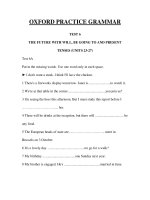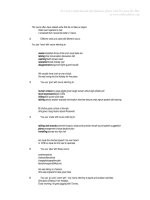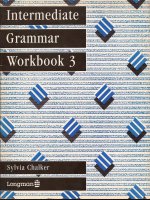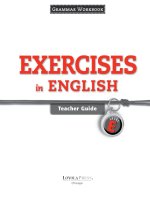Grammar workbook 6 potx
Bạn đang xem bản rút gọn của tài liệu. Xem và tải ngay bản đầy đủ của tài liệu tại đây (198.46 KB, 6 trang )
In this part . . .
I
f you’ve ever built a house — with real bricks or with
kiddy blocks — you know that the whole thing is likely
to fall down unless it’s sitting atop a strong foundation.
This part provides the stuff you need to lay the best foun-
dation for your writing. Chapter 1 takes you through
Verbology 101, explaining how to select the best verb for
present, past, and future situations. In the same chapter,
you find the most popular irregular verbs and everything
you need to know about the ever-helpful helping verb.
Chapter 2 sorts verbs into singular and plural piles and
helps you match each verb to the correct subject. Then
you’re ready to pair pronouns and nouns (Chapter 3) and
to distinguish complete from incomplete or too-long sen-
tences (Chapter 4). Ready? I promise I won’t let the roof
fall on your head!
04_599321 pt1.qxp 4/3/06 8:52 PM Page 8
Chapter 1
Placing the Proper Verb
in the Proper Place
In This Chapter
ᮣ Examining past, present, and future tenses
ᮣ Practicing the perfect tenses
ᮣ Navigating among irregular forms
ᮣ Handling helping verbs
A
s short as two letters and as long as several words, verbs communicate action or state
of being. Plus, even without a new Rolex, they tell time. Unfortunately, that handy little
time-keeping function, like the buttons on my watch, can be confusing. In this chapter, I hit
you with basic time questions. No, not “You’re late again because . . . ?” but “Which verb
do I need to show what’s completed, not yet begun, or going on right now?” The first sec-
tion hits the basic tenses (past, present, and future) and the second hits the perfect tenses,
which are anything but perfect. After that, you can work on irregulars and helping verbs.
Choosing among Past, Present, and Future
Verbs tell time with a quality known as tense. Before you reach for a tranquilizer, here’s the
lowdown on the basic tenses. You have three, and each has two forms — lo-carb and fat-
free. Sorry, I mean plain (called by its basic time designation — present, past, or future) and
progressive (the -ing form of a verb). Progressive places a little more emphasis on process or
on action that spans a time period, and the present progressive may reach into the future.
In many sentences, either plain or progressive verbs may be used interchangeably. Here’s a
taste of each:
ߜ Past tense tells what happened either at a specific, previous time or describes a pat-
tern of behavior in the past. (In the sentence “Diane tattooed a skull on her bulging
bicep,” tattooed is a past tense verb. In “During the Motorcycle Festival, Diane was flex-
ing her bicep,” was flexing is a verb in past progressive tense.)
ߜ Present tense tells you what’s going on now at the present moment, or more gener-
ally speaking, what action is recurring. It also touches the future. (In the sentence
“Grace rides her Harley,” rides is a present tense verb. In “Grace is always polishing her
Harley” and “Grace is riding to Florida,” the verbs is polishing and is riding are in pres-
ent progressive tense.)
ߜ Future tense moves into fortune-teller land. (The verb in “Grace will give Diane a ride
around the block” is will give, which is in future tense. In “Grace will be bragging about
her new motorcycle for months,” will be bragging is in future progressive tense.)
05_599321 ch01.qxp 4/3/06 11:22 PM Page 9
Okay, time to check out a sample problem. The infinitive (the grandpappy of each
verb family) follows every sentence. Stay in that family when you fill in the blank,
choosing the correct tense. When you’re finished with this sample, try the practice
problems that follow.
Q. Yesterday, overreacting to an itty-bitty taste of arsenic, Mike _______________ his evil twin
brother of murder. (to accuse)
A. accused. The clue here is yesterday, which tells you that you’re in the past.
1. Fashion is important to David, so he always _______________ the latest and most popular
poaching style. (to select)
2. Last year’s tight, slim lines _______________ David, who, it must be admitted, does not
have a tiny waist. (to challenge)
3. While David _______________ new clothes, his fashion consultant is busy on the sidelines,
recommending stripes and understated plaids to minimize the bulge factor. (to buy)
4. David hopes that the next fashion fad _______________ a more mature, oval figure like his
own. (to flatter)
5. Right now Diane _______________ an article for the fashion press stating that so-tight-it-
may-as-well-be-painted-on leather is best. (to write)
6. She once _______________ a purple suede pantsuit, which clashed with her orange “I Love
Motorcycles” tattoo. (to purchase)
7. While she _______________ the pantsuit, two shoppers urged her to “go for it.” (to charge)
8. Two days after Diane’s shopping spree, Grace _______________ about show-offs who
“spend more time on their wardrobes than on their spark plugs.” (to mutter)
9. However, Diane knows that Grace, as soon as she raises enough cash, _______________ in
a suede outfit of her own. (to invest)
10. David, as always, _______________ in with the last word when he gave Grace and Diane the
“Fashion Train Wreck of the Year” award. (to chime)
11. Two minutes after she received the award, Diane _______________ it on a shelf next to her
“Best Dressed, Considering” medal. (to place)
12. Every day, when I see the medal, I _______________ what “considering” means.
(to wonder)
13. Grace _______________ it to me in detail yesterday. (to explain)
14. “We earned the medal for considering many fashion options,” she _______________.
(to state)
15. David, who _______________ Diane tomorrow, says that the medal acknowledges the fact
that Grace is “fashion-challenged” but tries hard anyway. (to visit)
10
Part I: Laying Out the Concrete Slab: Grammar Basics
05_599321 ch01.qxp 4/3/06 11:22 PM Page 10
Shining a Light on Not-So-Perfect Tenses
The perfect tenses tack has, have, or had onto a verb. Each perfect tense — present
perfect, past perfect, and future perfect — also has a progressive form, which includes
an -ing verb. The difference between plain perfect tense and progressive perfect is
subtle. The progressive perfect is a bit more immediate than the plain form and refers
to something that’s ongoing or takes places over a span of time. In many sentences
the plain and progressive forms may be interchanged. Here’s when to use the perfect
tenses:
ߜ Present perfect links the past and the present. An action or state of being
began in the past and is still going on. (In the sentence “Despite numerous
reports of sightings around the world, Kristin has stayed close to home,” the
verb has stayed is in present perfect tense. In “Kristin has been living within two
miles of the Scottish border for the last decade,” has been living is a present per-
fect progressive tense verb.)
ߜ Past perfect places one event in the past before another event in the past.
(The verb in “Mike had dumped his dirty laundry in his mother’s basement long
before she decided to change the front-door lock” is had dumped, which is in
past perfect tense. In the sentence “Christy, Mike’s mother, had been threatening
a laundry strike for years, but the beginning of mud-wrestling season pushed her
to the breaking point,” had been threatening is a past perfect progressive tense
verb.)
ߜ Future perfect implies a deadline sometime (surprise, surprise) in the future.
(In the sentence “Before sundown, David will have toasted several dozen loaves
of bread,” will have toasted is in future perfect tense. The verb in “By the time
you turn on the television, Eye on Cooking will have been covering the toasting
session for two hours, with six more to go,” is will have been covering, which is in
future perfect progressive tense.)
Practice, especially with these verbs, makes perfect, so try this example and then
plunge ahead. The verb you’re working on appears as an infinitive (the basic, no-tense
form) at the end of the sentence. Change it into the correct tense and fill in the blank.
Q. Kristin _______________ an acceptance speech, but the “Spy of the Year” title went to
Hanna instead. (to prepare)
A. had prepared. With two events in the past, the had signals the prior event. The preparing
of the speech took place before the awarding of the title, so had prepared is the form you
want.
16. Mike _______________ on thin ice for two hours when he heard the first crack. (to skate)
17. Diane _______________ Mike for years about his skating habits, but he just won’t listen.
(to warn)
18. David — a delicate, sensitive soul — accompanied Mike to the pond and then to the hos-
pital. After David _______________ an hour, the doctor announced that the skater was free
to go. (to wait)
19. After today’s skating trip ends, David _______________ a total of 1,232 hours for his friend
and _______________ countless outdated magazines in the emergency room family area.
(to wait, to read)
11
Chapter 1: Placing the Proper Verb in the Proper Place
05_599321 ch01.qxp 4/3/06 11:22 PM Page 11
20. Grace _______________ to speak to Mike ever since he declared that “a little thin ice”
shouldn’t scare anyone. (to refuse)
21. Mike, in a temper, pointed out that Grace’s motorcycle _______________ him to the
hospital even more frequently than his skates. (to send)
22. In an effort to make peace, Kristin _______________ quietly to both combatants before
they ever stop yelling at each other. (to speak)
23. Despite years of practice, Tim _______________ success only on rare occasions, but he
keeps trying to resolve his brother’s conflicts anyway. (to achieve)
24. At times Tim’s conflict-resolution technique _______________ of violent finger pokes in the
fighters’ ribs, but he is trying to become more diplomatic. (to consist)
25. After Mike _______________ that his brother’s wisest course of action was to “butt out,”
Tim simply ignored him. (to declare)
26. We all think that Tim _______________ up on conflict resolution by the time Mike turns 30.
(to give)
27. Despite failing with Mike every time he tries to avoid a quarrel, Tim _______________
interest in a diplomatic career several times over the last few weeks. (to express)
28. Although Mike _______________ several ambassadors about his brother’s career plans
during his visit to the United Nations last week, no one granted Tim an interview yester-
day, though he spent the day begging for “just five minutes.” (to approach)
29. Kristin, the soul of kindness, said that before Tim makes his next career move, she
_______________ that “it’s hard to break into this field” at least five times. (to declare)
30. David could help, as he _______________ as an ambassador for the last seven years and
won’t retire until 2010. (to serve)
Navigating among Irregular Forms
Designed purposely to torture you, irregular verbs stray from the usual -ed form in
the past tense. The irregularity, which doesn’t entitle you to the sale price the way it
does for irregular sheets or other things that are actually useful, continues in a form
called the past participle. You don’t need to know the terms; you just need to know
what words replace the usual -ed verb configuration (sang and sung instead of singed,
for example).
You can’t memorize every possible irregular verb. If you’re unsure about a particular
verb, look it up in the dictionary. The definition will include the irregular form.
Here’s a set of irregular problems to pickle your brain. Fill in the blanks with the cor-
rect irregular form, working from the verb indicated in parentheses. Notice that the
parentheses don’t, strictly speaking, contain a verb at all — just the ancestor of that
particular verb family, the infinitive. Check out the following example.
12
Part I: Laying Out the Concrete Slab: Grammar Basics
05_599321 ch01.qxp 4/3/06 11:22 PM Page 12
Q. With one leg three inches shorter than the other, Natalie seldom _______________ into
second base, even when the team was desperate for a base hit. (to slide)
A. slid. No -ed for this past tense! Slid is the irregular past form of to slide.
31. If you discover a piece of pottery on the floor, look for Natalie, who has _______________
many vases because of her tendency to dust far too emotionally. (to break)
32. Once, Natalie _______________ with sadness at her first glimpse of a dusty armchair.
(to shake)
33. David, no mean duster himself, _______________ a manual of daily furniture maintenance.
(to write)
34. The manual, entitled Dust or Die, _______________ to the top of the best-seller list. (to rise)
35. News reports indicated that nearly all the copies had been _______________ by fanatical
cleaners. (to buy)
36. David once dusted the fire alarm so forcefully that it went off; the firefighters weren’t
amused because David had _______________ the fire alarm a little too often. (to ring)
37. The fire chief promptly _______________ to speak with the mayor about David’s false
alarm. (to go)
38. The mayor has _______________ an investigation into a new category of offenses, “False
Dust Alarms”; almost immediately, David _______________ to protest. (to begin)
39. “I have _______________ to a new low,” sighed David, as he enrolled in the local chapter of
Clean Anonymous. “I hear that Natalie has _______________ a new hobby. Maybe I can
too.” (to sink, to find)
40. Natalie _______________ David to a fly-catching meet, and soon his interest in grime
_______________ the dust. (to take, to bite)
41. Natalie, however, became completely excited by fly catching and _______________ a
tapestry with a delicate fly pattern. (to weave)
42. David, worried about Natalie’s enthusiasm for winged pests, _______________ help.
(to seek)
43. “Leave the flies,” _______________ David. (to say)
44. “Never!” Natalie declared as she _______________ her coffee. (to drink)
45. David soon _______________ up on Natalie and her new hobby. (to give)
Mastering the Two Most Common
Irregulars: Be and Have
Two irregular verbs, to be and to have, appear more frequently than a movie star with
a new film to promote. And like a movie star, they tend to cause trouble. Both change
according to time and according to the person with whom they’re paired. (Amazing
13
Chapter 1: Placing the Proper Verb in the Proper Place
05_599321 ch01.qxp 4/3/06 11:22 PM Page 13









